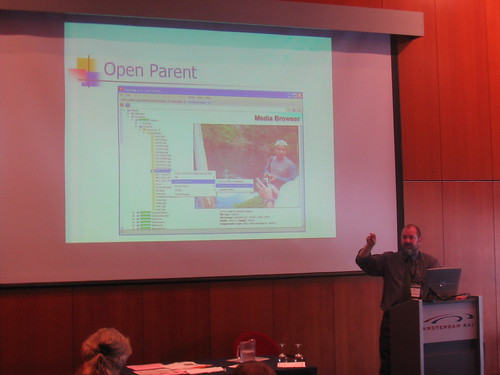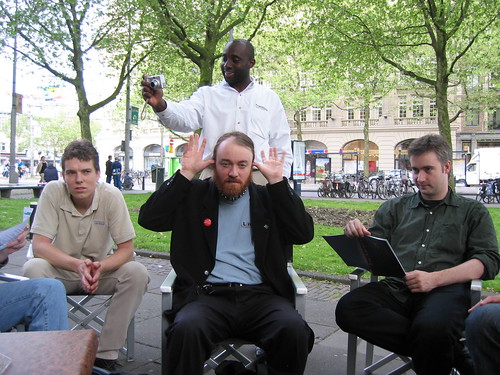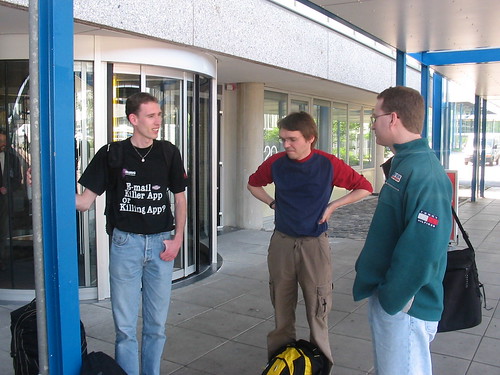XTech 2005. Amsterdam. Lovely time. But first of all, I went for a conference. Edd Dumbill outdid himself this time. The first coup de maître was sculpting the tracks to increase the interdisciplinary energy of the meet. The browser track brought out a lot of new faces and provided a jolt of energy. There did seem to be a bit of a divide between the browser types and the XML types, but only as much as one would expect from the fact that XML types tend to know each other, and ditto browser types. There was plenty of crosstalk between the disciplines as well.
Second touch: focus on open data, and all the excitement in that area (Creative Commons, remixing/mash-ups, picture sharing, multimedia sharing, microformats, Weblogging, content syndication, Semantic technology, podcasting, screencasting, personal information spaces, corporate info spaces, public info spaces, etc.) and watch the BBC take over (with they bad selves). And don't fret: "damn, maybe we should lighten up on the BBC bias it he speakers". No, just go with it. Recognize that they are putting forth great topics, and that everyone is amped about how the BBC is leading the way on so many information technology and policy fronts.
Third touch: foster collaboration. Put up a Wiki, encourage folks to an IRC channel, aggregate people's Weblog postings and snapshots into one place, Planet XTech, and cook up a fun little challenge to go with the theme of open data. For that last bit Edd put out an XML representation of the conference schedule and asked folks to do something cool with it. I didn't do as much with it as I'd hoped. When I finally got my presentation going I used the posted grid.xml as a demo file for playing with Amara, but I wished it had more content, especially mixed content (it's very attribute heavy). I've suggested on the XTech Wiki that if Edd does the same thing next time, that he work in paper abstracts, or something like that, to get in more text content.
I said "When I finally got my presentation going", which hints at the story of my RAI (venue for XTech) jinx. Last year in Amsterdam I couldn't get my Dell 8600 running Fedora Core 3 to agree with the projectors at the RAI. As Elliotte Rusty Harold understates in his notes from the 2004 conference:
After some technical glitches, Uche Ogbuji is talking about XML good practices and antipatterns in a talk entitled "XML Design Principles for Form and Function"
In fact I ended up having to switch to OpenOffice on Windows, and the attendees endured a font only a hippie could love (Apparently Luxi Sans is not installed by default on Windows and OO/Win has a very strange way of finding a substitute). I'm vain enough not to miss quoting another bit about my talk from Elliotte:
A very good talk. I look forward to reading the paper. FYI, he's a wonderful speaker; probably the best I've heard here yet.
Gratifying to know I managed a good talk under pressure. I hope I did so again this time, because the RAI projectors were no more friendly. The topic was "Matching Python idioms to XML idioms". Remembering the last year's headache I asked about a projector to use to test out my presentation (I was on the first day, Weds). Usually conference speakers' rooms have a spare projector for this purpose, but it looks as if the RAI couldn't supply one. I crossed my fingers and arrived for my talk the dutiful 15 minutes early. Eric van der Vlist was up before me in the block. The AV guy came along and they spent quite a while struggling with Eric's laptop (Several speakers had trouble with the RAI projectors). They finally worked out a 640x480 arrangement that caused him to have to pan around his screen. This took a while, and the AV guy bolted right afterward and was not there to help me set up my own laptop. Naturally, neither I nor the very helpful Michel Biezunski (our session chair) were able to get it to work, and we had to turn things over to Eric to start his talk.
We then both went in search of the AV guy, and it took forever to find him. No, they didn't have a spare projector that we could use to set up my laptop in time for my talk. We'd just have to wait for Eric to finish and hope for the best (insert choice sailor's vocabulary here). My time slot came and we spent 20 minutes trying every setting on my laptop and every setting on their projector. The AV guys (yeah, when it was crisis time, they actually found they had more than one) muttered taunts about Linux, and it's a lucky thing I was bent on staying calm. I present quite often, and I do usually have to try out a few settings to get things to work, but in my encounters it's only the RAI projectors that seem completely incapable to project from my Linux laptop. In all, I witnessed 4 speakers (3 on Linux and surprisingly one on Mac OS X) who had big problems with the RAI projectors, including one of the keynote speakers. I suspect others had problems as well.
I couldn't take the obvious escape route of borrowing someone else's laptop because the crux of my talk was a demo of Amara and I'd have to install all that as well (Several kind volunteers including Michel had 4Suite installed, but not Amara). After 20 minutes, we agreed that I'd go on with my talk on Michel's computer (Thinkpad running Red Hat 9 and it worked with the projector immediately!), skip the demo, and we'd find another time slot for me to give the entire talk the next day. Quite a few people stuck around through this mess and I'm grateful to them.
The next day we installed Amara on Michel's computer and I gave the presentation in its proper form right after lunch. There was great attendance for this reprise, considering everything. The Amara demo went fine, except that the grid.xml I was using as a sample gave too few opportunities to show off text manipulation. I'll post a bit later on thoughts relating to Amara, stemming from the conference. Norm Walsh was especially kind and encouraging about my presentation woes, and he has also been kind in his notes on XTech 2005:
The presentation [deities] did not smile on Uche Ogbuji. He struggled mightily to get his presentation of Matching Python Idioms to XML Idioms off the ground. In vain, as it turned out (AV problems were all too common for a modern conference center), but he was generous enough try again the next day and it was worth it (thanks Uche!). I'm slowly becoming a Python convert and some of the excellent work that he's done at Fourthought to provide Python access to standard XML in ways that feel natural in Python is part of the appeal.
That's the precise idea. A tool for processing XML that works for both Python heads and XML heads. The whole point of my presentation was how hard this is to accomplish, and how just about every Python tool (including earlier releases of 4Suite) accommodates one side and not the other. The response to Amara from both the Python heads and XML heads makes me feel I've finally struck the right balance.
I got a lot out of the other XTech talks. Read Norm on the keynotes: he pretty much had the same impressions as I did. Props to Michael Kay for his great presentation comparing XSLT 2.0 and XML Query. I took enough notes at that one for a separate entry, which will follow this one. I missed a lot of the talks between Kay's and my own while I was trying (unsuccessfully) to head off the AV gremlins.
Other talks to highlight: Jon Trowbridge's on Beagle (who, you guessed it, had AV problems that ate up a chunk of his time slot). From the project Wiki:
Beagle is a search tool that ransacks your personal information space to find whatever you're looking for. Beagle can search in many different domains: documents, emails, web history, IM/IRC conversation, source code, images, music files, applications and [much more]
Edd had already introduced me to Beagle, but it was really cool to see it in action. I'll have to check it out. Jon also pointed out TomBoy, "a desktop note-taking application for Linux and Unix. Simple and easy to use, but with potential to help you organize the ideas and information you deal with every day." Two projects I'll have to give a spin. Props to Jon for shrugging off the AV woes and giving a fun and relaxed talk.
Robert O'Callahan's talk on the new canvas tag for Mozilla and Safari
was memorable if for nothing else than the experience of surfing Google
at a 45°
angle,
with no apparent loss in snappiness. This canvas thingie looks wicked
cool, and it's good to see them working to incorporate SVG. I've heard
a lot of grumbling from W3C types about canvas, and all we poor browser
users in the middle can hope for is some rapid conversion of cool
technologies such as XAML, XUL, canvas, SVG, etc. Others have blogged
about the opportunities and anxieties opened up by the
WHATWG, which one commentator said should have
been the "WHAT Task Force" because "WTF" would have been a better
acronym. I'm a neutral in these matters, except that I really do with
browser folks would do what they can to push people along to XHTML 2.0
rather than cooking up HTML 5.0 and such.
Matt Biddulph was one of the BBC Massive on hand, and his talk "The Application of Weblike Design to Data - Designing Data for Reuse" offered a lot of practical tips on how to usefully open up a large body of data from a large organization.
Dominique Hazaël-Massieux gave a talk on GRDDL (O most unfortunate project name), which was my first hearing of the technology. My brief characterization of GRDDL is as an attempt to pull the Wild West ethos of microformats into the rather more controlled sphere of RDF. It touches on topics in which I've been active for years, including tools for mapping XML to RDF. I've argued all these years that RDF folks will have to embrace general XML in place of the RDF/XML vocabulary if they are to make much progress. They will have to foster tools that make extracting RDF model data from XML a no-brainer. It's great to see the W3C finally stirring in this direction. Dom's presented very well. I asked about the use of other systems, such as schema annotation, for the XML to RDF mapping. It seemed to me that GRDDL was mostly geared towards XSLT. Dom said it is meant to be independent of the mapping mechanism, but in my post-conference reading I'm not so sure. I'll have to ponder this matter more and perhaps post my thoughts. Dom also mentioned PiggyBank, "the Semantic Web extension for Firefox". Kingsley Idehen has a nice blurb on this software. I do hesitate to use it because someone mentioned to me how PiggyBank had gone into crazy thrash mode at one point. I don't muck with my FireFox set-up lightly.
Rick Jelliffe showed off Topologi's lightweight browser TreeWorld, which is XML-oriented and suitable for embedding into other applications.

Others have blogged Jean Paoli's closing keynote (http://glazman.org/weblog/dotclear/index.php?2005/05/29/1059-adam-3">Leigh, etc.). Seems I'm not the only one who was put off by the straight-up product pitch. At least he did a bit of a service by clearly saying "Binary XML: No please". Check out more quotes from XTech.
The conference was superb. Do be sure not to miss it next year. It's looking like Amsterdam will be the venue again. And what of Amsterdam? Besides the conference I had a great time with friends. I'll post on that later.
For the most comprehensive report I've seen to date, see Micah Dubinko's article.

